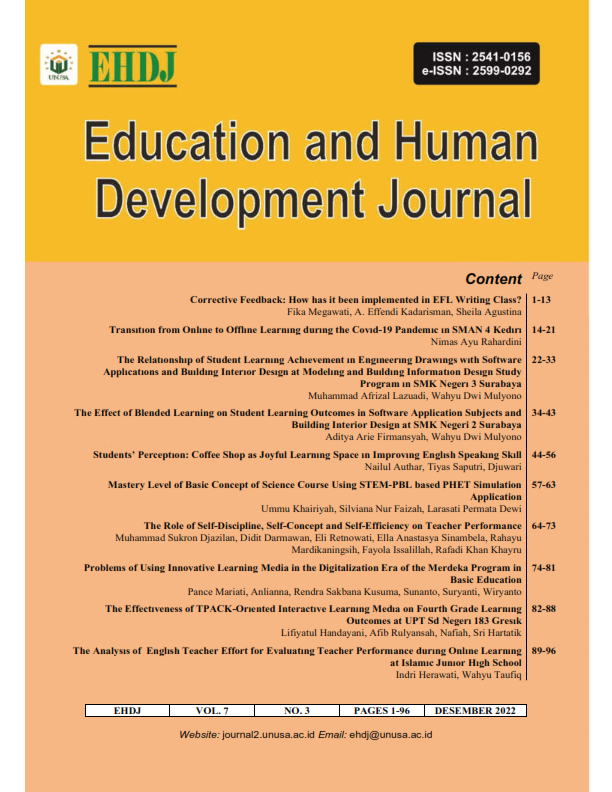Mastery Level of Basic Concept of Science Course Using STEM-PBL based PHET Simulation Application Mastery of Concepts; Phet Simulation; STEM-PBL
##plugins.themes.bootstrap3.article.main##
Abstract
This study aims to determine the effectiveness of using the Phet Simulation application based on STEM (Science, Technology, Engineering, and Mathematics) – PBL (Problem Based Learning) for mastering the basic concepts of science, especially the subject of Dynamic Electricity. This research was conducted on 1st Semester students from one of the PTKIS in Lamongan who taught the basic science concepts course for the 2022/2023 academic year, namely 35 people. The type of research used is quasi-experimental with a One Group Pretest-Posttest research design. The data collection techniques as the main data are pretest and posttest to find out the increase in mastery of the concept. The hypothesis testing in this study used the Paired Sample t Test using the SPSS 25 application. Based on the data obtained sig.2tailed 0.000 <0.05, it can be concluded that the use of the STEM-PBL-based phet simulation application is effective in increasing students' understanding of concepts
Downloads
##plugins.themes.bootstrap3.article.details##
Copyright (c) 2022 Ummu Khairiyah, Silviana Nur Faizah, Larasati Permata Dewi

This work is licensed under a Creative Commons Attribution-ShareAlike 4.0 International License.
References
Abdi, M. U., Mustafa, & Pada, A. U. T. (2021). Penerapan Pendekatan STEM Berbasis Simulasi PhET Untuk Meningkatkan Pemahaman Konsep Fisika Peserta Didik. Jurnal IPA dan Pembelajaran IPA, 5(3). DOI: https://doi.org/10.24815/jipi.v5i3.21774
Abdul, T. (2019). Penerapan Media Pembelajaran Virtual Laboratory Berbasis Phet terhadap Hasil Belajar Siswa pada Materi Gelombang. Jurnal Pendidikan Fisika Tadulako Online (JPFT), 7(3).
Arifin, M. M., Prastowo, S. B., & Harijanto, A. (2022). Efektivitas Penggunaan Simulasi Phet dalam Pembelajaran Online Terhadap Hasil Belajar Siswa. Jurnal Pembelajaran Fisika (JPF), 11(1). DOI: https://doi.org/10.19184/jpf.v11i1.30612
Ariyatun, A., & Octavianelis, D. F. (2020). Pengaruh Model Problem Based Learning Terintegrasi STEM terhadap Kemampuan Berpikir Kritis Siswa. Journal of Educational Chemistry (JEC), 2(1). DOI: https://doi.org/10.21580/jec.2020.2.1.5434
Astuti, I. A. D., & Handayani, S. (2018). Penggunaan Virtual Laboratory berbasis PhET Simulation Untuk Menentukan Konstanta Wien. Jurnal Penelitian Pembelajaran Fisika, 9(2), 1–6. DOI: https://doi.org/10.26877/jp2f.v9i2.2487
Capraro, R. M., Capraro, M. M., & Morgan, J. R. (2013). STEM Project-Based Learning an Integrates Science, Technology, Engineering, and Mathematics (STEM) Approach (2nd Edition). Rotterdam: Sense Publisher. DOI: https://doi.org/10.1007/978-94-6209-143-6
Emda, A. (2014). Laboratorium Sebagai Sarana Kimia dalam Meningkatkan Pengetahuan dan Keterampilan Kerja Ilmiah. Lantanida Journal, 2(2). DOI: https://doi.org/10.22373/lj.v2i2.1409
Farwati, R., Permanasari, A., Firman, H., & Suhery, T. (2017). Integrasi Problem Based Learning dalam STEM education berorientasi pada aktualisasi literasi lingkungan dan kreativitas. 198–206. Palembang: Prosiding Seminar Nasional Pendidikan IPA 2017-STEM untuk Pembelajaran Sains Abad 21.
Han, S. Y., Capraro, R. M., & Capraro, M. M. (2015). How science, technology, engineering, and mathematics (STEM) project-based learning (PBL) affect high, midle, and low achievers differently: The impact of student factors on achievement. achievers differently: The impact of student factors on achievement, 13(5), 1089–1113. DOI: https://doi.org/10.1007/s10763-014-9526-0
Karagoz, O., ÖZDENER, N., & Mirçik, Ö. K. (2010). Evaluation of The Usability of Different Virtual Lab Software Used in Physics Courses. Bulgarian Journal of Science and Education Policy, 4(2).
Krathwohl, D. R. (2002). A revision of Bloom’s Taxonomy An Overview. New York: Addison Wesley Lonman Inc. DOI: https://doi.org/10.1207/s15430421tip4104_2
Mayasari, T., Kadarohman, A., & Rusdiana, D. (2014). Pengaruh Pembelajaran Terintegrasi Science, Technology, Engineering, And Mathemathics (STEM) pada Hasil Belajar Peserta Didik: Studi Meta Analisis. Prosiding Semnas Pensa VI ”Peran Literasi Sains”.
Moore, E. B., Chamberlain, J. M., Parson, R., & Perkins, K. K. (2014). PhET Interactive Simulation: Transformative tools for Teaching Chemistry. Journal of Chemical Education, 91(8), 1191–1197. DOI: https://doi.org/10.1021/ed4005084
Nugraha, A. J., Suyitno, H., & Susilaningsih, E. (2017). Analisis Kemampuan Berpikir Kritis Ditinjau dari Keterampilan Proses Sains dan Motivasi Belajar melalui Model PBL. Journal of Primary Education, 6(1).
Putri, C. D., Pursitasari, I. D., & Rubini, B. (2020). Problem Based Learning Terintegrasi STEM di Era Pandemi Covid-19 Untuk Meningkatkan Keterampilan Berpikir Kritis Siswa. Jurnal IPA dan Pembelajaran IPA, 4(2), 193–204. DOI: https://doi.org/10.24815/jipi.v4i2.17859
Ramadani, E. M., & Nana. (2020). Penerapan Problem Based Learning Berbantuan Virtual Lab Phet pada Pembelajaran Fisika Guna Meningkatkan Pemahaman Konsep Siswa SMA: Literature Review. Jurnal Pendidikan Fisika Tadulako Online, 8(1).
Rizkiana, F., & Apriani, H. (2020). Simulation PhET: Pengaruhnya Terhadap Pemahaman Konsep Bentuk dan Kepolaran Molekul. Quantum: Jurnal Inovasi Pendidikan Sains, 11(1). DOI: https://doi.org/10.20527/quantum.v11i1.6412
Rochman, N. H., & Madlazim. (2013). Pengembangan Perangkat Pembelajaran Fisika Yang Bersinergi Dengan Media Lab Virtual PhET Pada Materi Sub Pokok Bahasan Fluida Bergerak Di MAN 2 Gresik. Jurnal Inovasi Pendidikan Fisika, 2(3).
Simanjuntak, M. P. (2014). Efektifitas Model Problem Based Learning Terhadap Penguasaan Konsep Mahasiswa Pada Konsep Suhu dan Kalor. Jurnal Inpafi, 2(3).
Sugiyono. (2016). Metode Penelitian Pendidikan (pendekatan kuantitatif, kualitatif, dan R&D). Bandung: Alvababeta.
Warimun, E. S. (2012). Penerapan Model Pembelajaran Problem Solving Fisika Pada Pembelajaran Topik Optik Pada Mahasiswa Pendidikan Fisika. Jurnal Exacta, 10(2).

